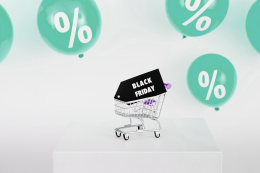
Tips to avoid being fooled this Black Friday
Black Friday means special deals and major savings - but not all deals are genuine. Keep reading to avoid getting scammed.
5 min read
Black Friday is a worldwide phenomenon. Shoppers from all over the globe flock to physical stores and online shopping sites to try and take advantage of the major sales going on that day. But if a deal seems too good to be true, it probably is. Read on to avoid getting ripped off on Black Friday.Black Friday is the day right after American Thanksgiving. It marks the kick-off of the holiday shopping season, and it’s become a time-honored tradition for stores and other retailers to try and attract shoppers by offering staggering discounts and special offers—the kind of bargains that would lure hordes of people out of their homes at the crack of dawn, the day after a major holiday.While Spain just adopted Black Friday around 2012, the tradition began in Philadelphia in the 1950s. The day after Thanksgiving, the city’s streets would be congested with traffic. Malls and other shops would shake with shoppers, all competing over sale items and trying to knock out their Christmas shopping in one day. Police had to come in to break up the chaos and direct traffic, and the day was ultimately dubbed Black Friday.These days, countless shops and vendors hold Black Friday events, offering lower prices than usual in order to boost their sales. But some of these shops are fooling customers, offering “discounts” that aren’t really saving you anymore. Some shops intentionally set high prices for the purpose of lowering them sharply on Black Friday.This tactic normally occurs with pricier products. For example, a television might sell for €630 all year round, but then have its price hiked up to €990 the week before Thanksgiving. Then when Black Friday rolls around, that price gets slashed to €690. Even though it might look like a discount of €300, it’s actually an increase of €60.In other cases, prices might stay the same or drop by just a few cents, but are nonetheless advertised as bargains. Think of a pair of gloves that normally are priced at €40. On Black Friday, the pair would be marked down to €39.90. It’s just a 10 cent discount, but it means the store can advertise them as “discounted” or “reduced.” Coupled with a sign listing the original price as €69.90, the gloves wind up looking like they’re discounted 43%—even though you’re really only saving a dime.The best way to dodge these tricks is to be aware of prices well in advance of Black Friday. Shop around and check out the different places certain products are available. Keep a list of the products you most want to purchase, and how much they cost at different outlets. If you’re serious about savings, you can even make a spreadsheet and start keeping track of the prices over time. Then, when Black Friday arrives, you can compare your price list to the Black Friday price. It will be easy to spot which prices are more or less the same, and which prices are seriously slashed.Start subscribing to newsletters from your favorite retailers in advance. Lots of companies offer exclusive discounts via email. Due to data protection laws, these discount codes are only sent to those who’ve subscribed to a company’s marketing communication. So next time you make an online purchase and they ask if you want to receive updates to your email, go ahead and check that box. If it turns out the company is overflowing your inbox, not providing deals you want, or you’re just not into the brand anymore, you can always unsubscribe. Just wait until after Black Friday to be sure you don’t miss any truly special deals.In Spain, Black Friday is generally associated with big companies like Amazon, the Inditex group, and other high tech giants. This has prompted a lot of discussion over how Black Friday is affecting smaller businesses.Now, even smaller stores have jumped on the Black Friday bandwagon, but this is partly because they were left with no other way to compete with multimillion-dollar—or multibillion-dollar—global corporations. In order to keep small businesses afloat, consumers should remember to support them on Black Friday—and any day, really. Visit stores (if COVID regulations allow), shop online, and recommend your friends and family do the same. This way, small businesses might have a fighting chance in the competition.Amazon—a Black Friday pioneer— is a leading player in this international shopping event. They offer numerous products that are available exclusively on their platform, and it’s often the cheaper and more convenient method in comparison to other retailers. But many of Amazon’s Black Friday deals are only available to their premium customers—Prime members—who have to pay a separate fee. Like stealthy pickpockets in a crowded market, online scammers can be hard to spot. They exploit the tension of holiday shopping with stressful messaging like “Hurry, offer ends now!” or “Don’t miss out on the best deals: only 3 hours and 15 minutes remaining!” In the midst of this virtual hullabaloo, it’s easy for them to commit fraud and run online scams.N26 uses 3D Secure technology for online payments, as well as enhanced two-factor authentication. Since extra precautions make all the difference, you can also check out our online security guide.
What is Black Friday?
What Black Friday scams are out there?
How to outsmart scams
How get the most out of Black Friday
Where to buy on Black Friday
Black Friday and small businesses
Amazon and Black Friday
Online scams and digital pickpockets
Find similar stories
BY N26Love your bank
Related Post
These might also interest youLIFESTYLECould AI help you manage your money?86% of people are open to using AI for financial planning, but is it safe? Learn how AI is already transforming money management, and discover the pros and cons.
4 min read
LIFESTYLEUnderstanding tariffsFrom higher grocery bills, pricier electronics, and stock market swings, tariffs can impact your wallet and your investments.
5 min read
LIFESTYLEDe-hyping the no-spend challengeThis extreme challenge promises to transform your finances, but is it really the game-changer it claims to be?
4 min read


